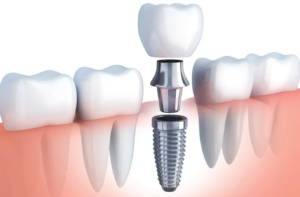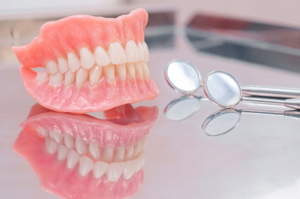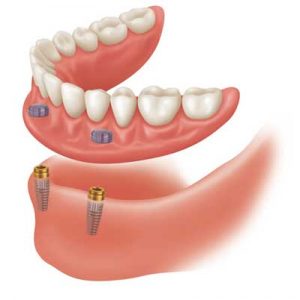
If you’re exploring options for replacing missing teeth, you might be wondering whether DENTAL IMPLANTS and DENTURES are the better choice for you. This article will provide a clear comparison between dental implants and dentures, discussing their benefits, drawbacks, costs, and who might be a suitable candidate for each. By the end, you’ll have a solid understanding of both dental implant and dentures to help you make an informed decision.
Key Takeaways
- Dental implants offer superior stability and durability, integrating with the jawbone for a natural feel, while preserving adjacent natural teeth and enhancing oral health.
- Dentures are a removable option for replacing missing teeth, but they can require frequent adjustments and replacements, making them less stable over time compared to implants.
- Consulting with a dentist is essential to determine the most suitable tooth replacement option, considering factors like oral health, budget, and personal lifestyle preferences.
Understanding Dental Implants

Unlike traditional dentures, dental implants are fixed and do not slip or move, offering a more comfortable and natural experience. Further details about the benefits of dental implants and suitable candidates for the procedure are provided below.
Benefits of Dental Implants
Before:
Dental implants offer numerous advantages that make them a preferred choice for many. One of the most significant benefits is their ability to preserve adjacent teeth without the need to file them down. This means that your remaining natural teeth remain intact, contributing to long-term oral health. Dental implants enhance chewing efficiency and comfort, surpassing other tooth replacement options.
After:
Dental implants offer numerous advantages that make them a preferred choice for many:
- They preserve adjacent teeth without the need to file them down.
- Your remaining natural teeth remain intact, contributing to long-term oral health.
- They enhance chewing efficiency and comfort, surpassing other tooth replacement options.
Aesthetically, dental implants provide a natural-looking smile, enhancing your overall appearance and boosting your confidence. They are designed to last many years, even a lifetime, with proper care. This longevity makes them a cost-effective solution over time, despite the higher initial investment.
Additionally, they enhance speech by staying securely in place, unlike conventional dentures. The stability they offer allows you to enjoy your favorite foods without worrying about your teeth moving out of place. Overall, dental implants provide a combination of comfort, durability, and aesthetics that other tooth replacement options struggle to match.
Who Is a Good Candidate for Dental Implants?
Not everyone is an ideal candidate for dental implants. Key factors include having healthy gums and adequate bone support to anchor the implants securely. Those considering dental implants should consult with their dentist to assess their oral health, including the condition of their teeth, gums, and jawbone.
Individuals with sufficient jawbone density are typically good candidates for dental implants. However, certain health conditions that affect bone healing may disqualify someone from being a suitable candidate.
During the consultation, the dentist will evaluate these factors and provide personalized recommendations to ensure the best possible outcomes.
Exploring Dentures

Dentures come in various types, each designed to meet different needs. Below is an exploration of the various types of dentures along with their pros and cons.
Types of Dentures
There are several types of dentures available, each catering to specific needs. Complete dentures are designed to replace all natural teeth within an arch, offering a cost-effective and natural-looking solution for those missing all teeth in an arch. For individuals who still have some remaining natural teeth, partial dentures can fill in the gaps left by missing teeth while retaining the existing teeth.
Temporary partial dentures, or flippers, serve as a removable solution for those awaiting a more permanent option such as implants or dental bridges. These are particularly useful for maintaining the appearance of a full smile during the interim period.
Permanent dentures, while typically removable dentures, can require adjustments over time due to changes in the jawbone structure. Fixed dentures are usually made from materials such as porcelain or plastic, providing a durable and aesthetically pleasing tooth replacement option.
Pros and Cons of Dentures
Dentures offer several advantages, including stability, improved speech, and a natural appearance. They are relatively easy to maintain, as they can be removed and cleaned as needed. This makes daily oral hygiene straightforward and manageable.
However, dentures also come with some downsides. They can become less stable over time and may require frequent adjustments or replacements to maintain a proper fit. Additionally, dentures need to be replaced every five years on average to ensure they continue to function effectively.
Despite these challenges, dentures remain a popular choice for many due to their affordability and versatility in replacing missing teeth.
Comparing Dental Implants and Dentures

On the other hand, dentures may require more frequent adjustments or replacements due to wear and changes in the mouth’s shape. A detailed comparison of costs, longevity, and maintenance requirements for both options is provided below.
Cost Comparison
Dental implants generally have a higher initial cost, typically ranging from $3,600 to $5,200 per tooth. However, their longevity and durability may make them more cost-effective in the long run. Unlike dentures, which may need to be replaced every few years, dental implants can last a lifetime with proper care, potentially saving money over time.
Permanent dentures, while more affordable initially, come with long-term maintenance costs that can add up. Weighing these factors carefully will help determine the best option for your budget and needs.
Longevity and Durability
Dental implants are known for their exceptional longevity and durability. They can endure for decades, potentially lasting a lifetime with proper oral hygiene and care. Unlike natural teeth, dental implants do not decay, offering a long-term solution without the issues associated with traditional dental work.
Dentures, however, may need to be replaced or adjusted more frequently due to wear and changes in the mouth’s shape. Despite this, proper post-treatment care can extend the lifespan of both dental implants and dentures.
Maintenance Requirements
Dental implants require regular maintenance routines similar to those of natural teeth, including regular brushing and flossing. They do not need to be removed for cleaning, making their care straightforward and familiar to most people.
In contrast, dentures require daily maintenance, including soaking and cleaning to prevent oral health issues. This routine can be more labor-intensive compared to the care needed for dental implants. Comprehending these maintenance requirements will aid in selecting the tooth replacement option that best fits your lifestyle.
Implant Supported Dentures
Implant-supported dentures offer a hybrid solution for those seeking the stability of dental implants combined with the cost-effectiveness of dentures. These dentures are securely attached to dental implants placed in the jawbone, providing enhanced stability and comfort compared to conventional dentures. Implant-supported dentures are particularly beneficial for individuals missing most or all of their teeth or those with significant tooth loss.
The benefits and process of obtaining implant-supported dentures are detailed below.
Benefits of Implant Supported Dentures
Before:
Implant-supported dentures offer several unique advantages over traditional dentures. They provide improved stability and comfort, allowing for better chewing ability and overall dietary choices. This stability also enhances the user experience by preventing the dentures from shifting, slipping, or wobbling.
After:
Implant-supported dentures offer several unique advantages over traditional dentures:
- Improved stability
- Enhanced comfort
- Better chewing ability
- Broader dietary choices
- Prevention of shifting, slipping, or wobbling
These benefits significantly enhance the user experience.
Additionally, implant-supported dentures help preserve bone density by replacing some tooth roots, which can prevent the bone loss typically associated with traditional dentures. This makes them a more lifelike and effective solution for tooth replacement.
Process of Getting Implant Supported Dentures
The process of getting implant-supported dentures involves several steps. During the initial visit, patients can receive estimates of costs and time for treatments related to implant-supported dentures. The suitability for this type of dentures depends on the health and density of the jawbone, medical history, and personal preferences.
Patients can choose between fixed implant-supported dentures and removable options, depending on their needs and preferences. This flexibility allows for a tailored solution that meets individual requirements.
Post-Treatment Care for Implants and Dentures

Specific guidelines for the care of dental implants and dentures are provided to help you maintain your new smile.
Caring for Dental Implants
Daily care routines for dental implants are similar to those for natural teeth. A rotary toothbrush and specialized floss help prevent plaque buildup around the implants. A soft nylon toothbrush is recommended to avoid scratching the surface of the implants.
Daily flossing around dental implants is crucial to maintain oral health, and avoiding hard and sticky foods can help protect the implants from damage. Regular dental check-ups are also necessary to ensure the implants remain in good condition.
Caring for Dentures
To care for your dentures, remove and brush them daily to prevent bacteria buildup and maintain oral hygiene. Soaking dentures overnight in a cleaning solution can help preserve their shape and cleanliness.
Being honest about your ability and willingness to perform daily care for your dentures ensures they stay effective and comfortable.
Choosing the Right Option for You

The significance of consulting with your dentist and considering personal preferences and lifestyle in choosing the right tooth replacement option is discussed below.
Consulting with Your Dentist
A consult with your dentist is crucial when deciding between dental implants and dentures. Your dentist can provide personalized recommendations based on the condition of your teeth, gums, and jawbone, as well as your overall oral health. Factors such as gum disease and bone density will influence your eligibility for dental implants.
While most healthy individuals qualify for dental implants, discussing any health conditions that may affect suitability is important. Personalized advice from your dentist will help you make the best decision for your long-term oral health.
Considering Personal Preferences and Lifestyle
When choosing between dental implants and dentures, consider your personal preferences and lifestyle. Factors such as price, health of your jawbone and remaining teeth, and your willingness to maintain the chosen option should be taken into account.
Generally speaking, dental implants offer a more permanent and hassle-free solution, while dentures might be preferable for those looking for a less invasive and more affordable option. Assessing your needs honestly will help you choose the best tooth replacement option for your lifestyle.
Summary
Deciding between dental implants and dentures is a significant decision that impacts your oral health, comfort, and lifestyle. Dental implants provide a durable, natural-looking, and long-lasting solution that can greatly enhance your quality of life. They offer superior stability, functionality, and aesthetics but come with a higher initial cost and require sufficient bone density for support.
On the other hand, dentures are a more affordable and less invasive option that can effectively replace missing teeth and restore your smile. Although they may require more frequent adjustments and maintenance, they remain a viable choice for many, especially those who may not qualify for implants. Ultimately, consulting with your dentist and considering your personal preferences and lifestyle will guide you to the best tooth replacement option for your needs.
Frequently Asked Questions
What are the main differences between dental implants and dentures?
Dental implants provide a permanent, stable solution that resembles natural teeth, while dentures are removable, more budget-friendly, but require regular adjustments. Ultimately, the choice depends on personal preferences and budget considerations.
How long do dental implants last compared to dentures?
Dental implants can last for decades or even a lifetime with proper care, while dentures generally require replacement every five years. This makes implants a more durable and long-term solution for tooth loss.
What factors determine if I’m a good candidate for dental implants?
You must have healthy gums and sufficient bone support to be a good candidate for dental implants. Additionally, any conditions impacting bone healing should be assessed with your dentist to determine your suitability.
Are implant-supported dentures better than traditional dentures?
Implant-supported dentures are indeed better than traditional dentures, as they provide superior stability, comfort, and functionality by securely attaching to dental implants in the jawbone. This prevents the shifting and slipping often experienced with conventional dentures.
What is the maintenance routine for dental implants?
To ensure the longevity of dental implants, it’s essential to maintain a routine of regular brushing and flossing, akin to natural teeth, along with consistent dental check-ups to monitor the implant’s integrity and surrounding tissues. This proactive approach supports long-term oral health. For those exploring the best options for missing teeth, dental implants in Rockville provide a reliable and long-lasting solution.



